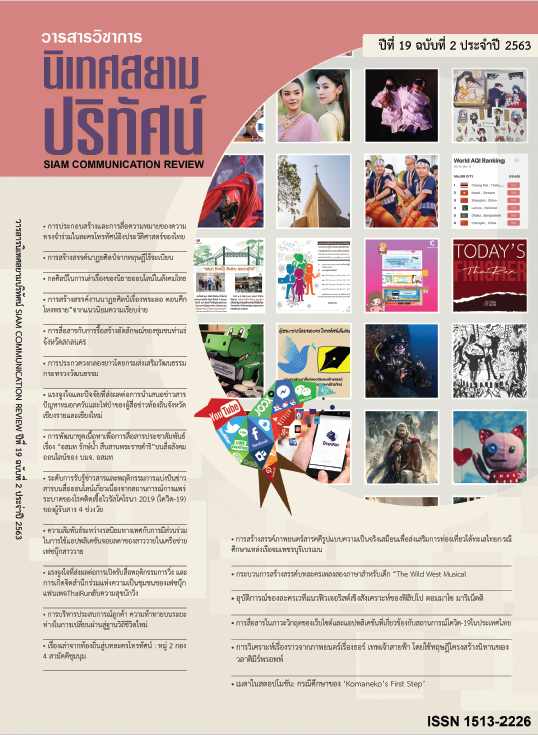Narrative Device of Internet Fiction in Thai Society
Main Article Content
Abstract
A qualitative study of narrative device of internet fiction in Thai society aims to explore narrative device of internet fiction in the Thai context. The data is collected through in – depth interview and textual analysis. The findings reveal that internet fiction was influenced by traditional storytelling of romance genre and attributes of Web 2.0. As a result, internet fiction adjusted to become more contemporary reflecting in its story, conversational writing and multimedia storytelling. The recent aesthetics of internet fiction blurred the line of high art and mass art in Thai society. In addition, writers affected by readers in collaborative process indirectly through observation on trends of fiction popularity and comments of readers in Thailand’s online literary communities.
Article Details
References
พัทธ์ธีรา โรจน์รัฐคณาธร. (2553). การวิเคราะห์นวนิยายอินเทอร์เน็ต: กรณีศึกษานวนิยายของแสตมป์เบอรี่. วิทยานิพนธ์ปริญญามหาบัณฑิต ภาควิชาภาษาไทย คณะอักษรศาสตร์, มหาวิทยาลัยศิลปากร.
ร เรือในมหาสมุท. (2560). ชายใดเล่าจะแซ่บเท่าแฟนเก่าแม่. กรุงเทพฯ: เอเวอร์วาย.
อนุชา พิมศักดิ์. (2558). อัตลักษณ์ความเป็นลูกผสมในนวนิยายวัยรุ่นไทยสมัยนิยม. ใน เทียมสูรย์ สิริศรีศักดิ์ และ อิสระ ชูศรี (บก.). วัฒนธรรมสมัยนิยม (น. 165 – 182). นครปฐม: สถาบันวิจัยภาษาและวัฒนธรรมเอเชีย มหาวิทยาลัยมหิดล.
อารดา ปรีชาปัญญา. (2553). การวิเคราะห์อัตลักษณ์นวนิยายไทยบนอินเทอร์เน็ต. วิทยานิพนธ์ปริญญามหาบัณฑิต สาขาวิชาสื่อศิลปะและการออกแบบสื่อ คณะวิจิตรศิลป์, มหาวิทยาลัยเชียงใหม่.
ภาษาอังกฤษ
Dingjia, C. (2011). Preservation and Innovation in Online Literature: A Brief Discussion. Social Sciences in China, 32(1), 129 – 145.
Hockx, M. (2015). Internet Literature in China. New York: Columbia University Press.
Koss, M. D. (2009). Young Adults Novels with Multiple Narrative Perspectives: The Changing Nature of YA Literature. The Alan Review, 36(3), 73 - 80.
Pennington, M. C. & Waxler, R. P. (2018). Why Reading Books Still Matters: The Power of Literature in Digital Times. New York: Routledge.
Roach, C. M. (2016). Happily Ever After. Indiana: Indiana University Press.
Yongqing, Z. (2011). Reflecting on Online Literature. Social Sciences in China, 32(1), 182 – 190.
ออนไลน์
พี่แนนนี่เพน. (2561, 13 ตุลาคม). “ลี้” ร เรือในมหาสมุท กับนิยายพลังบวกที่ส่งต่อความคิดดี ๆ ให้คนอ่าน. [เว็บบล็อก]. เข้าถึงได้จาก https://www.dek-d.com/writer/50882/
ศิริวรรณ สิทธิกา. (30 เมษายน 2561). เพทาย จิรคงพิพัฒน์ นักเขียนมือรางวัล ที่สร้างผลงาน 18 เล่ม ในกรงขังของร่างกาย. [เว็บบล็อก]. เข้าถึงได้จาก https://themomentum.co/petai-writer-typhoon/
Bold, M. R. (2016). The Return of the Social Author: negotiating authority and influence on Wattpad. Retrieved from https://www.researchgate.net/publication/ 304070253_The_return_of_the_social_ author_Negotiating_authority_and_influence_ on_ Wattpad
Gehrmann, S. (2018). Remediating Romance: Forms and Functions of New Media in Contemporary Love Stories from Togo and South Africa. Retrieved from https://muse.jhu.edu/article/715785
Jones, R. (2015). Mashing, Modding, and Memeing: Writing for a New Generation of University Students. Retrieved from https://www.academia.edu/9360194/Mashing_modding_and_memeing_Writing_for_a_new_generation_of_university_students
Miller, M. (2015). What Wattpad Brings to the Publishing Table. Retrieved from https://thewinnower.com/papers/3268-what-wattpad-brings-to-the-publishing-table
Pennington, M. C. (2017). Literacy, Culture, and Creativity in a Digital Era. Retrieved from https://muse.jhu.edu/article/652345


